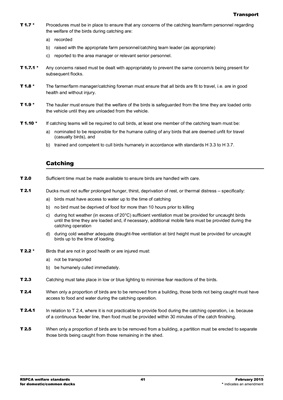
Transport
RSPCA welfare standards
for domestic/common ducks
41 February 2015
* indicates an amendment
T 1.7 * Procedures must be in place to ensure that any concerns of the catching team/farm personnel regarding
the welfare of the birds during catching are:
a) recorded
b) raised with the appropriate farm personnel/catching team leader (as appropriate)
c) reported to the area manager or relevant senior personnel.
T 1.7.1 * Any concerns raised must be dealt with appropriately to prevent the same concern/s being present for
subsequent flocks.
T 1.8 * The farmer/farm manager/catching foreman must ensure that all birds are fit to travel, i.e. are in good
health and without injury.
T 1.9 * The haulier must ensure that the welfare of the birds is safeguarded from the time they are loaded onto
the vehicle until they are unloaded from the vehicle.
T 1.10 * If catching teams will be required to cull birds, at least one member of the catching team must be:
a) nominated to be responsible for the humane culling of any birds that are deemed unfit for travel
(casualty birds), and
b) trained and competent to cull birds humanely in accordance with standards H 3.3 to H 3.7.
Catching
T 2.0 Sufficient time must be made available to ensure birds are handled with care.
T 2.1
Ducks must not suffer prolonged hunger, thirst, deprivation of rest, or thermal distress - specifically:
a) birds must have access to water up to the time of catching
b) no bird must be deprived of food for more than 10 hours prior to killing
c) during hot weather (in excess of 20°C) sufficient ventilation must be provided for uncaught birds
until the time they are loaded and, if necessary, additional mobile fans must be provided during the
catching operation
d) during cold weather adequate draught-free ventilation at bird height must be provided for uncaught
birds up to the time of loading.
T 2.2 * Birds that are not in good health or are injured must:
a) not be transported
b) be humanely culled immediately.
T 2.3 Catching must take place in low or blue lighting to minimise fear reactions of the birds.
T 2.4 When only a proportion of birds are to be removed from a building, those birds not being caught must have
access to food and water during the catching operation.
T 2.4.1 In relation to T 2.4, where it is not practicable to provide food during the catching operation, i.e. because
of a continuous feeder line, then food must be provided within 30 minutes of the catch finishing.
T 2.5 When only a proportion of birds are to be removed from a building, a partition must be erected to separate
those birds being caught from those remaining in the shed.